OneTrust vs UpGuard: Who Wins in 2023? [Review]
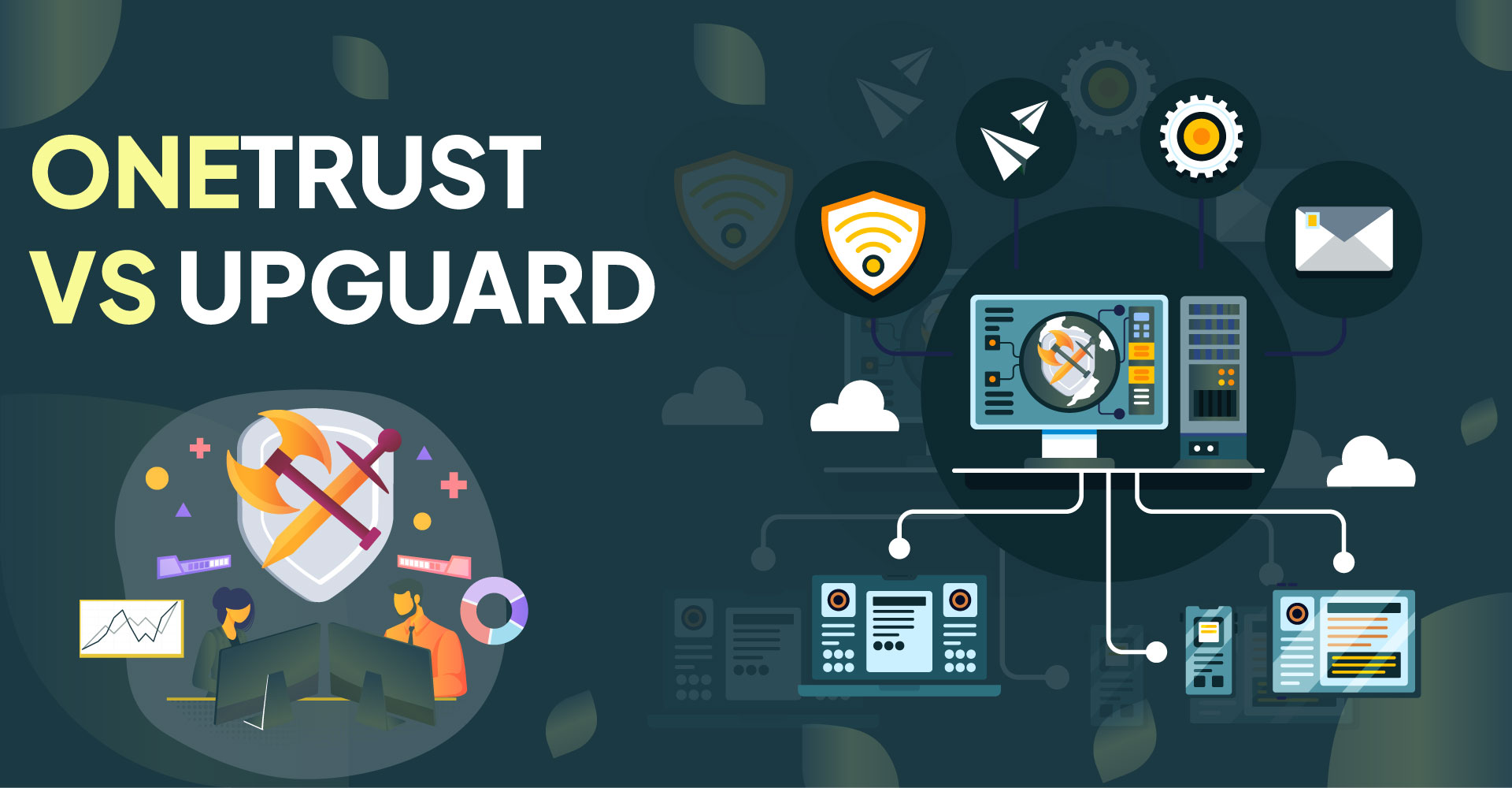
Table of Contents
OneTrust vs UpGuard
The main difference between OneTrust and Upguard is that OneTrust focuses on privacy management and compliance while Upguard specializes in cybersecurity risk assessments and vendor risk management.
In this article, we review the top features of each platform as well as individual pros and cons. We also explore an alternative option for those who aren’t satisfied with the features available through either of our two main contenders.
What are OneTrust and UpGuard?
Both OneTrust and Upguard are concerned with data protection and risk management. Their features help businesses stay secure, aware, and compliant with regulatory guidelines, each with its own strategy for doing so.
OneTrust was launched in 2016 by CEO Kabir Barday, a privacy attorney and entrepreneur. His inspiration came when he observed the changing landscape of data privacy, driven by events like the European Union's General Data Protection Regulation (GDPR), which came into effect in 2018.
OneTrust was built to facilitate simple compliance for businesses, with a suite of tools for data mapping, data request management, consent management, website compliance, privacy impact assessments, and more. The company’s success has made OneTrust a market leader in privacy management.
Upguard was founded in 2012 by Mike Baukes and Alan Sharp-Paul. As IT professionals, these co-founders were well-acquainted with the challenges organizations face managing their IT infrastructure. They recognized that the increasing complexity of IT environments, along with the proliferation of third-party vendors and cloud services, present new cybersecurity risks that need attention.
Upguard’s services were built with these goals in mind—to prioritize security rating tools, vendor risk assessments, cybersecurity posture assessments, continuous monitoring, and more. Their strategies help large and mid-sized enterprises create the type of ironclad security posture that customers expect.
OneTrust Pros and Cons
OneTrust provides a rich, diverse feature set to improve an organization’s compliance, transparency, and resilience. Extensive customizations and integration capabilities aren’t always a given in data privacy software, but OneTrust goes beyond to prove its value to users.
1. Privacy and Data Governance
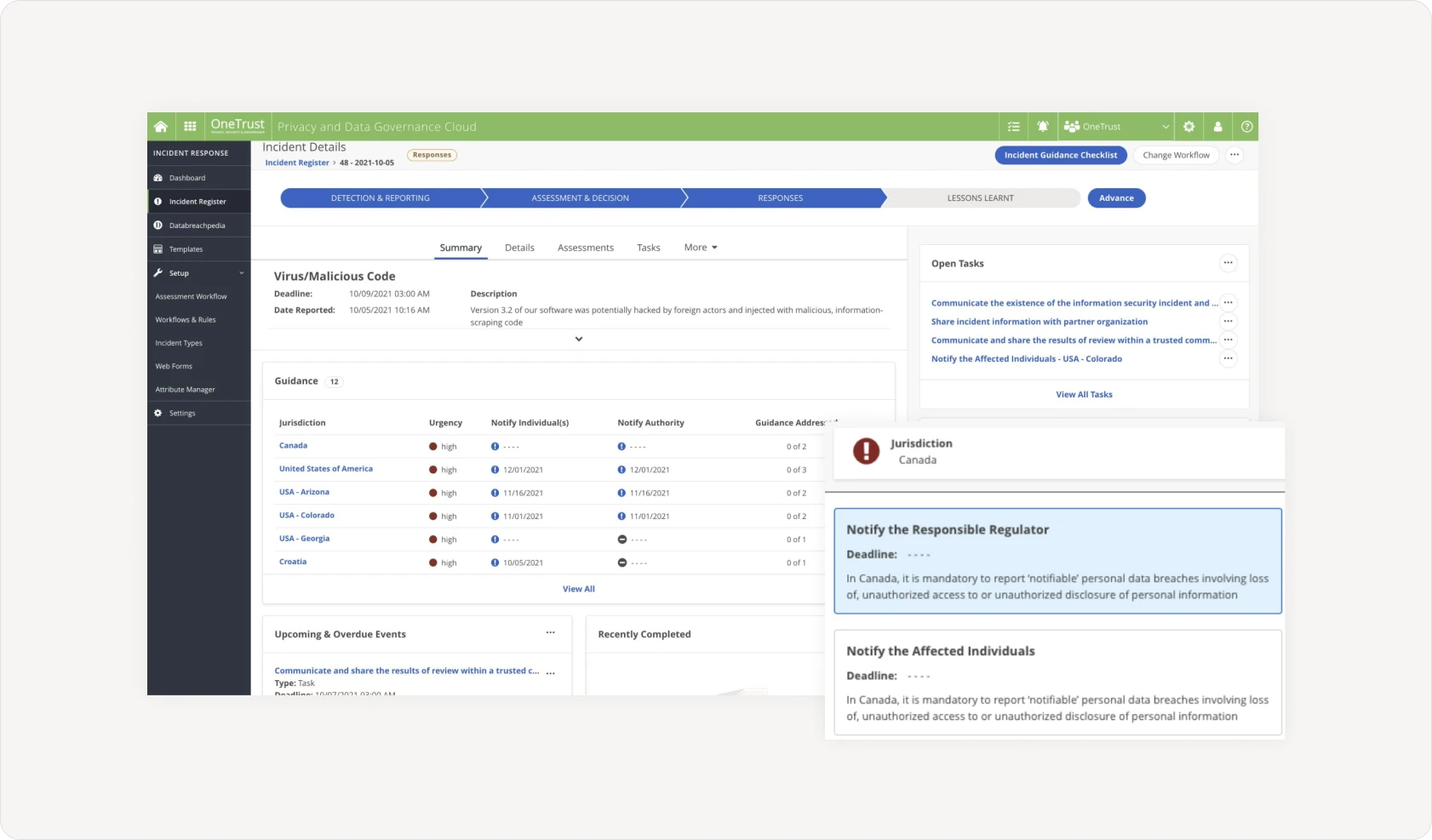
OneTrust's sophisticated Privacy and Data Governance solutions offer real-time access to personal data managed by your organization and third-party vendors. This advanced platform serves as a cornerstone that maintains compliance among multifaceted regulatory frameworks.
2. ESG and Sustainability
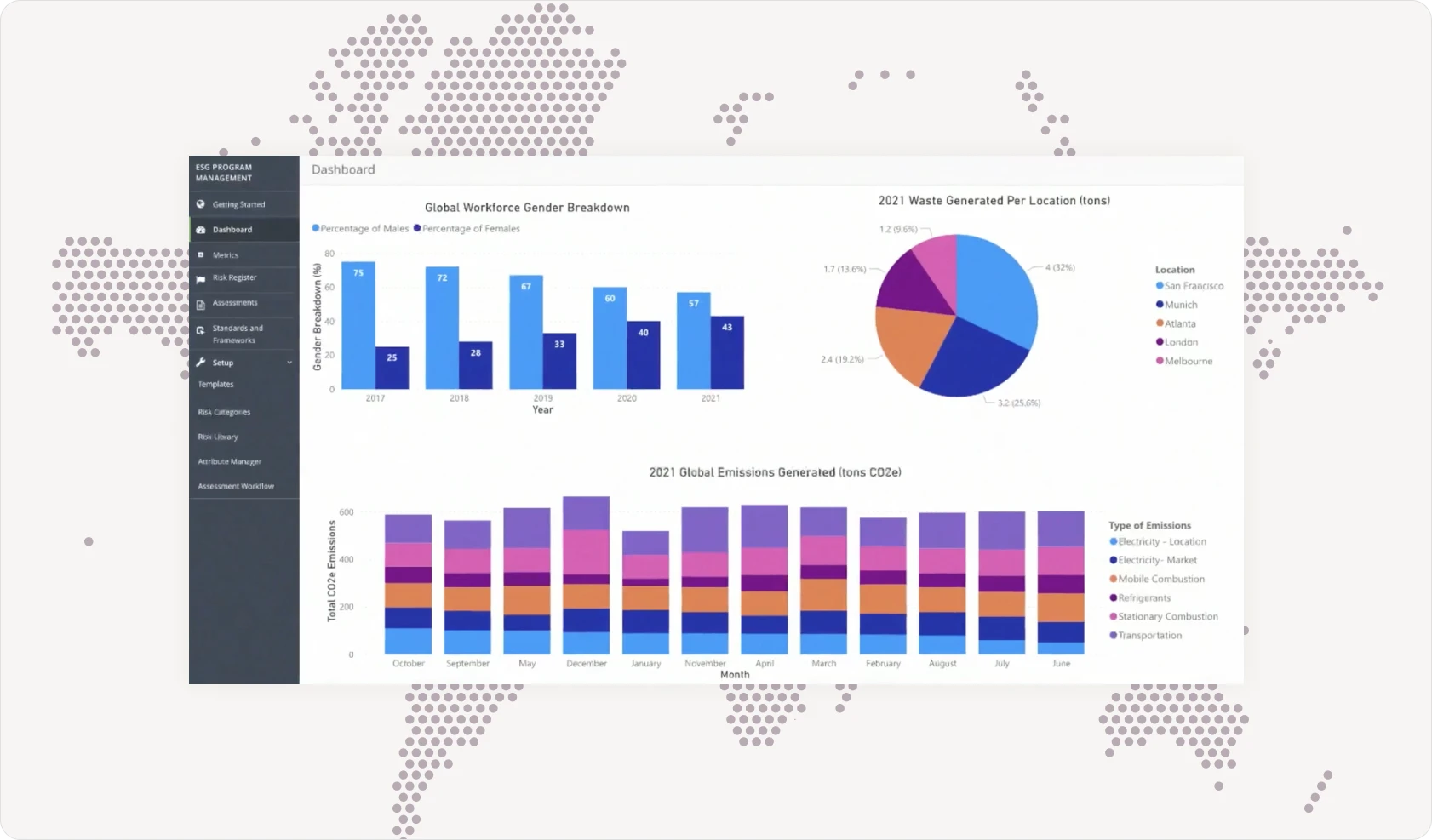
For companies with forward-thinking goals around sustainability and green improvements, OneTrust offers its innovative ESG and Sustainability cloud. This handy tool lets users define core ESG metrics and create actionable, shareable plans that keep everyone in the loop on progress made.
3. GRC and Security Assurance
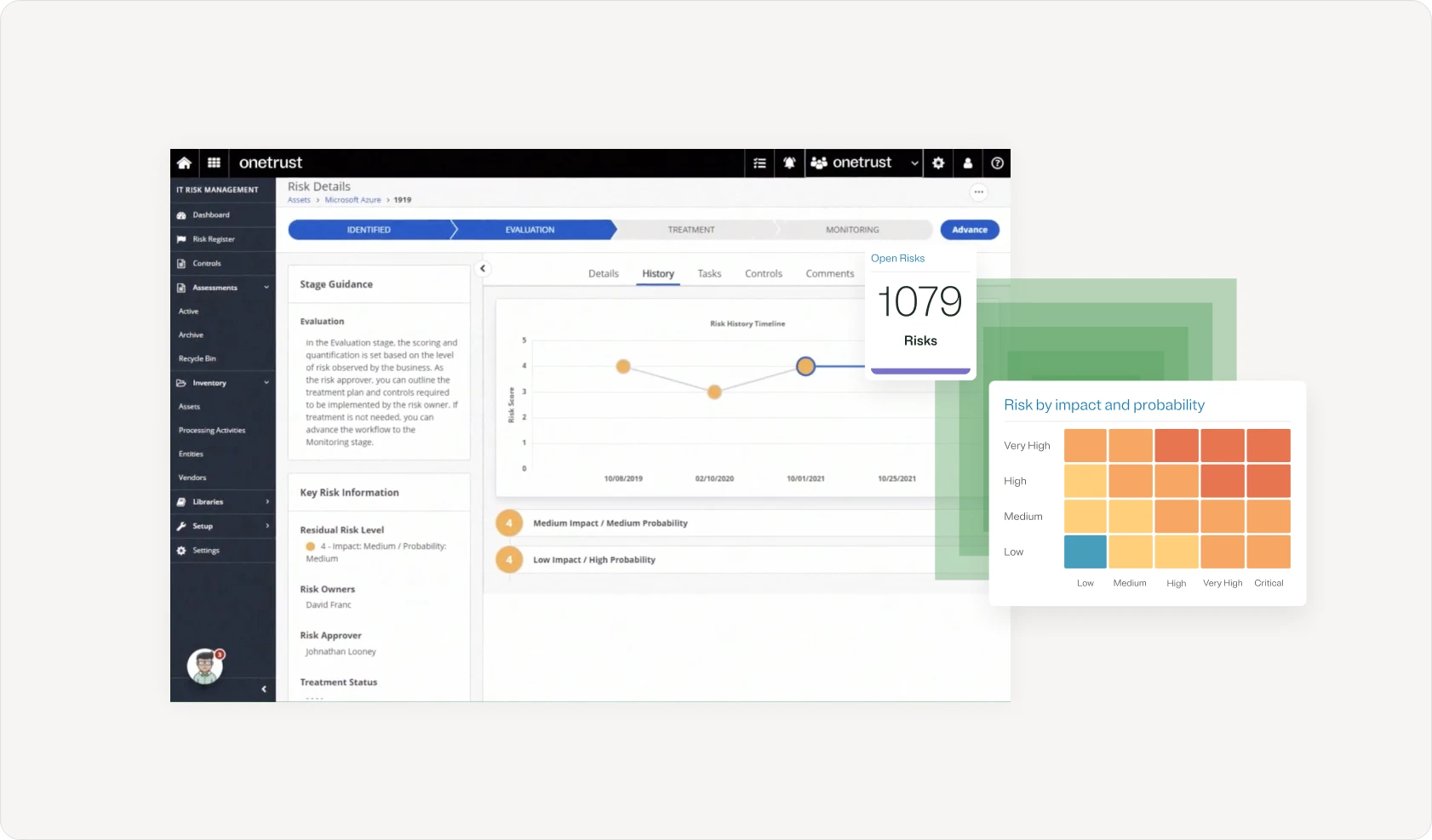
OneTrust’s GRC and Security Assurance solution provides a unified platform for risk-based decision-making, which helps companies operationalize and scale their security and compliance processes.
OneTrust has many great features on the top of those listed here, and its extensibility adds further growth potential as well. The company’s vast suite of features make it an ideal choice for larger organizations that want to take charge of data and compliance.
Pros of OneTrust:
- Powerful feature set for large to mid-sized companies
- Forward-thinking solution that positions companies well to scale
- Strong integration potential with other systems
Cons of OneTrust:
- Long-term contracts with expensive plans
- Poor and unresponsive customer support
- Complex platform that is difficult to set up and integrate
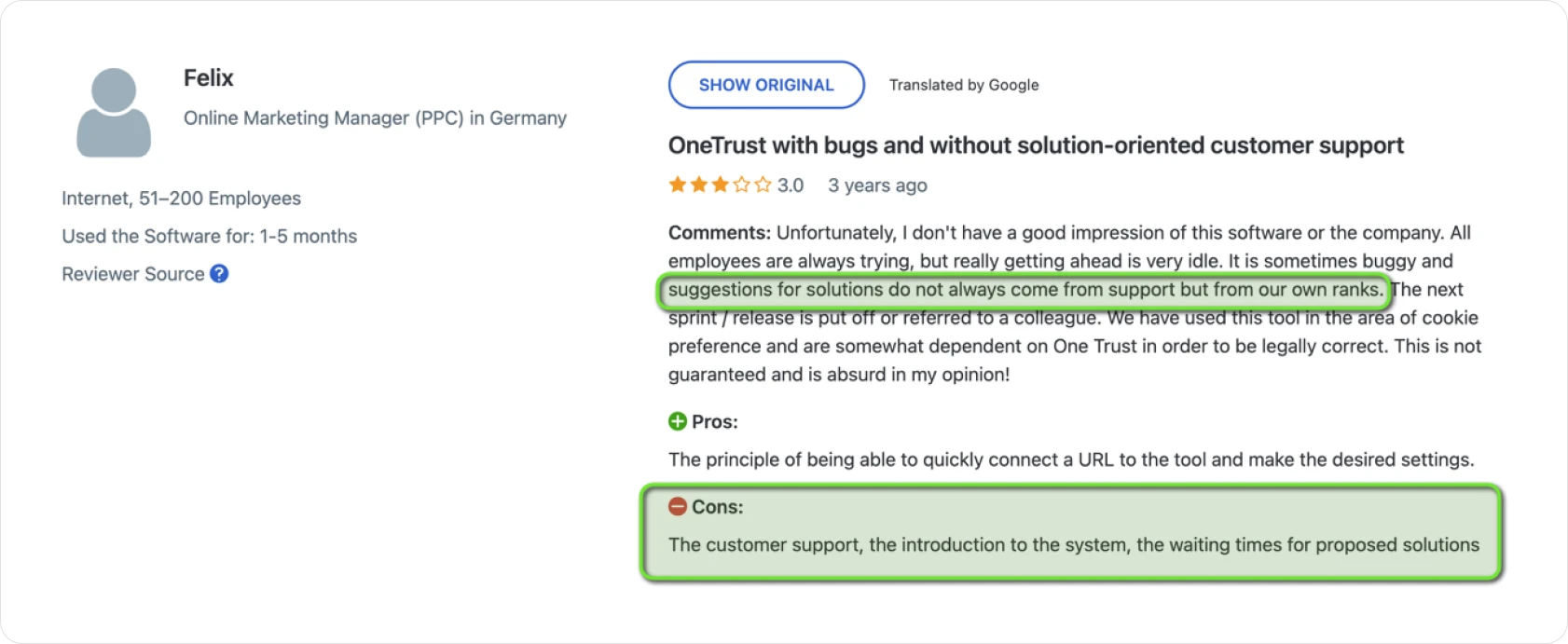
Overall Thoughts on OneTrust
OneTrust is a solid enterprise solution for companies that are able to commit to its strict contract and pricing terms. However, the solution can be cumbersome and tricky to integrate with existing platforms due to its complexity. It’s not a platform for smaller businesses or beginners; worse yet, customer support is often unresponsive, leaving users to resolve issues on their own.
As online reviews indicate, many users struggle to put OneTrust into action:
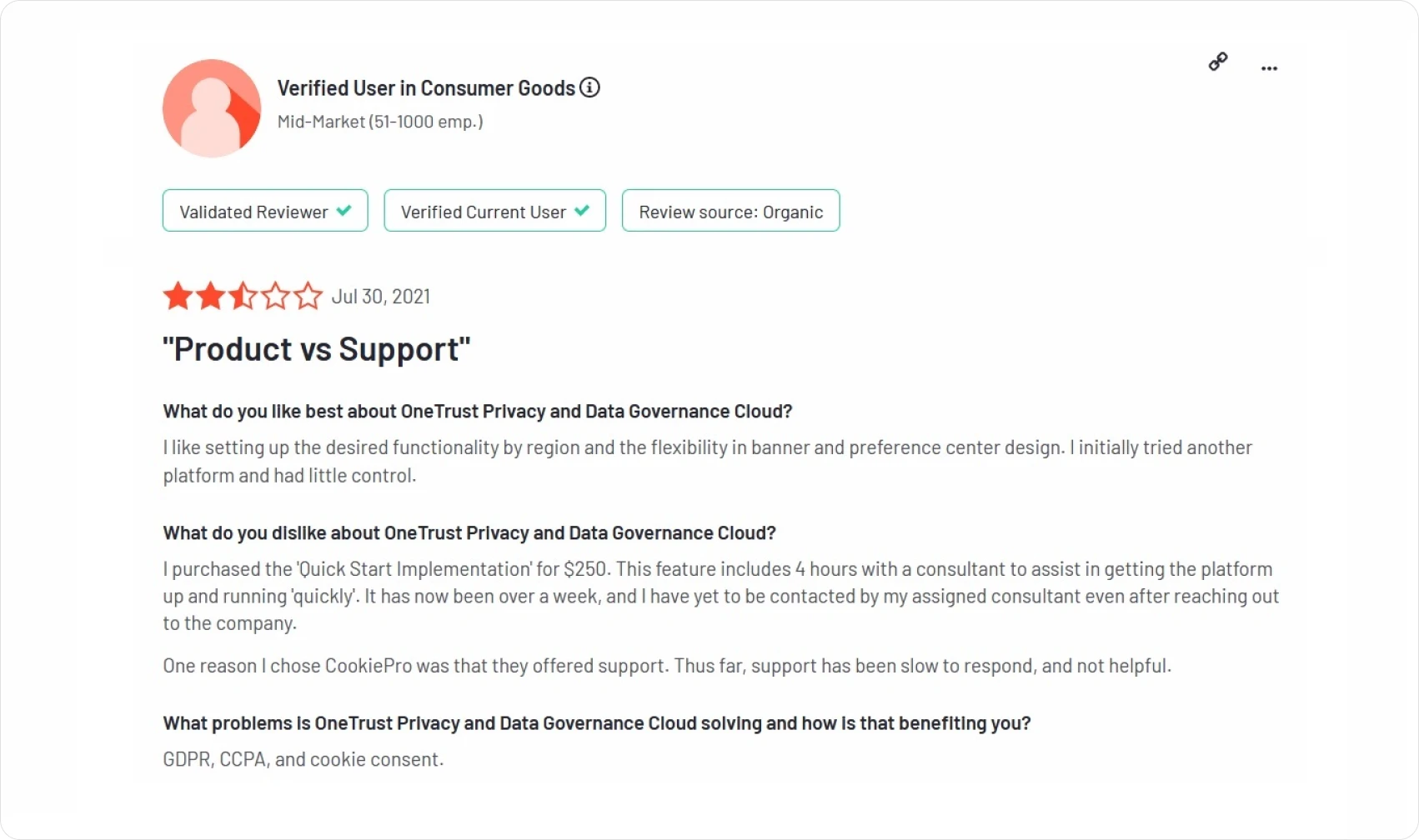
OneTrust is a suitable option for those with substantial resources to invest in compliance and who can rely on in-house implementation experts to manage the platform. With average contract values ranging upward of $50,000, companies will have their hands full to get OneTrust up and running. But for those willing to dedicate themselves to the process, it can be a powerful solution for compliance.
📢 Looking to evaluate companies similar to OneTrust? Check out the top OneTrust alternatives.
UpGuard Pros and Cons
UpGuard’s biggest strength is how it helps businesses mitigate cyber risks, improve their security posture, and ensure compliance with various industry standards and regulations. While Upguard’s features do include compliance management tools, the platform is more focused on assessing (and preventing) the risks posed by vendors and third-parties.
To that end, Upguard offers several noteworthy features to support its client base:
1. Third-Party Risk Management
.webp)
UpGuard’s Vendor Risk tool provides a centralized dashboard for third-party risk assessments. It offers a single source of truth for risk assessment workflows, vendor communications, and real-time updates on the company’s security posture.
2. Attack Surface Management
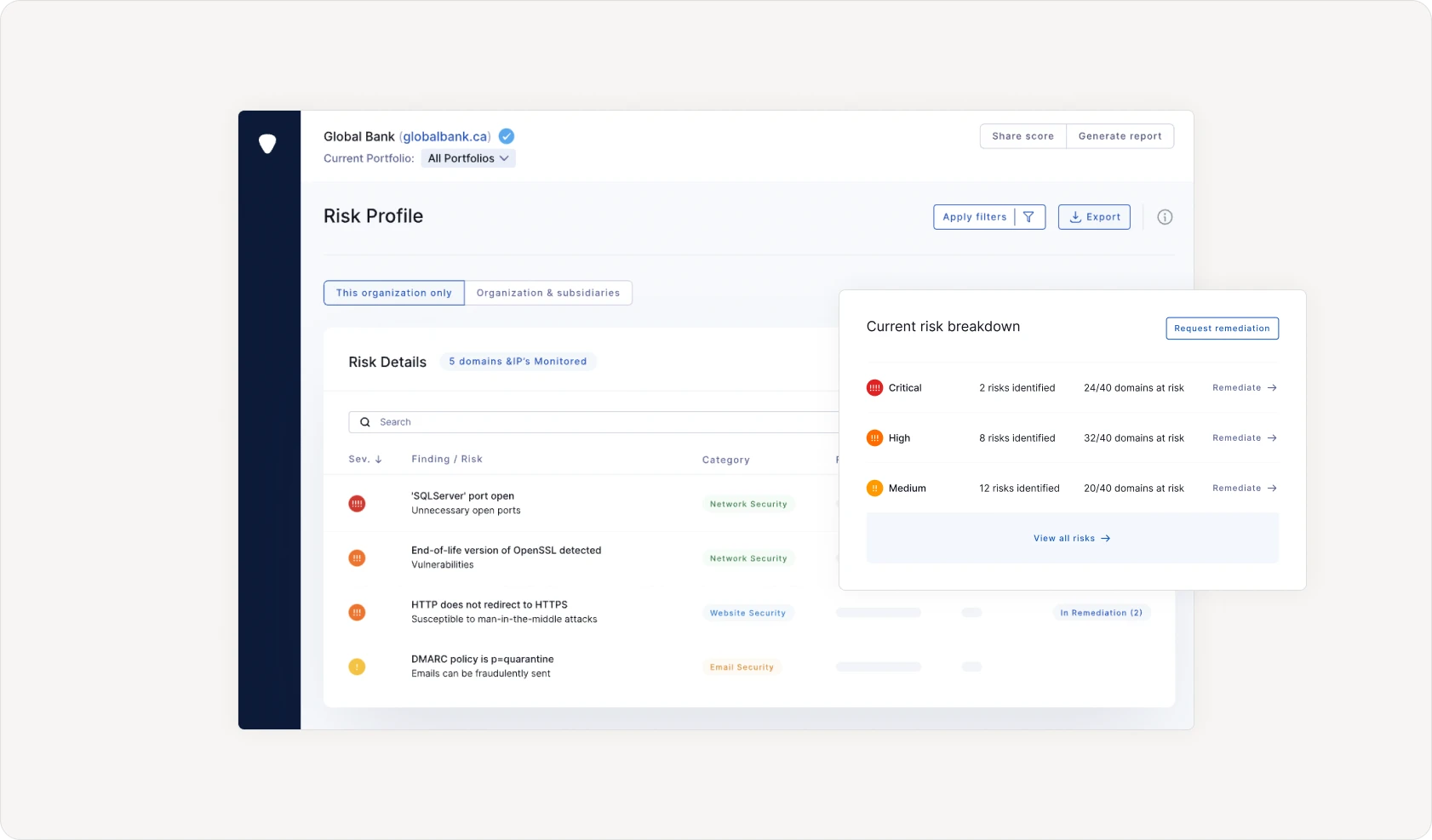
The UpGuard BreachSight tool tackles another critical aspect of security by helping companies manage their external attack surfaces. This solution helps companies address and respond to emerging security threats quickly to make sure that they’re able to maintain the customer trust they’ve worked hard to build.
3. Continuous Monitoring
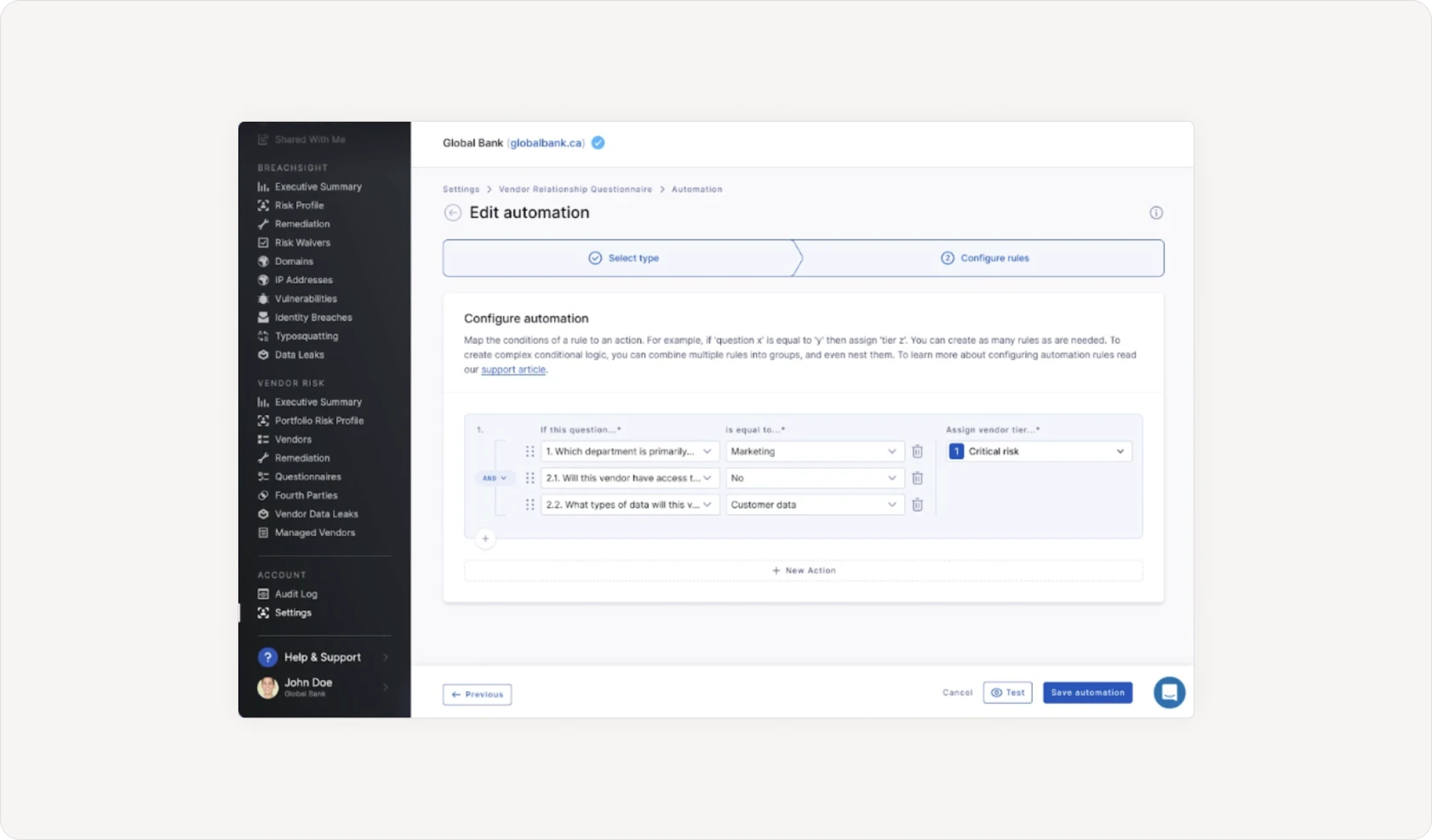
Together, UpGuard’s solutions provide a system of continuous monitoring and visibility that gives companies complete insight into their security profiles. From data leak detection to tailor-made reports, Upguard offers a rich feature set that ensures companies will always be in the loop on the state of their security posture.
Pros of UpGuard
- Comprehensive risk management tools provide a holistic view of security
- Automated reporting features save time during analysis
- Ongoing monitoring and real-time alerts provide assurance and peace of mind
Cons of UpGuard
- Poor user experience (UX) across tools can be difficult to manage
- Users report that pricing does not scale well with service
- The system’s complexity can require substantial effort to manage in-house
Overall Thoughts on UpGuard
UpGuard’s collective features enable organizations to assess, manage, and mitigate cyber risks from a single dashboard. However, like many enterprise tools, Upguard comes with high costs and a level of complexity that makes it a challenge to manage in-house. Upguard offers tiered pricing options that range from $6,000/year to $90,000/year, depending on the desired feature set.
With such a broad range of solutions included in an inherently complex platform, it’s no surprise that users struggle to use Upguard to its fullest potential.
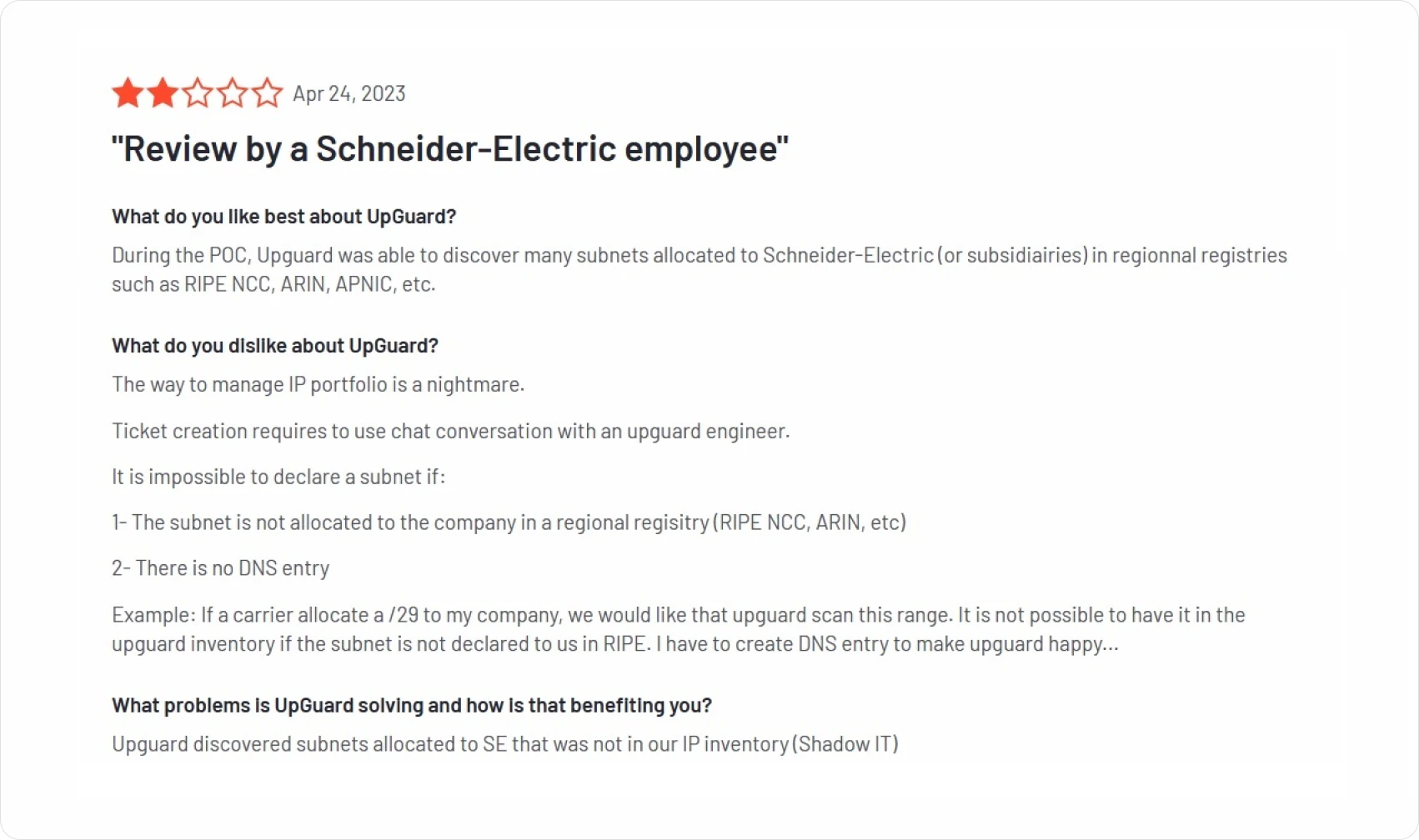
Upguard is a solid choice for businesses that have diverse needs across cybersecurity, monitoring, and compliance. Its robust feature set can’t be ignored, nor can the excellent automated features that help users streamline operations in key areas. But at the end of the day, companies must invest heavily in Upguard, both in financial cost and time spent in onboarding, training, and platform management.
OneTrust vs UpGuard: Who Wins in 2023?
While OneTrust and Upguard share some overlap in their services, each platform represents a different specialty: OneTrust for data privacy compliance and Upguard for cybersecurity risk assessment. Businesses with particular needs in each of these areas may want to weigh the platform’s strengths as a primary deciding factor.
However, the two platforms do share much in common, and it’s worth going over a head-to-head comparison of where the two service providers stand in 2023.
UX & Onboarding
As online reviews suggest, both OneTrust and Upguard are considered complicated to use and even more difficult to master. Users on both fronts struggle to make the best possible use of their platforms, but here, we have to give the edge to OneTrust.
Upguard scored low in usability and in creating a workable UX across the board. Despite its purportedly simple dashboard, users report frustration when they try to corral each of the solution’s feature sets. While neither candidate is ideal in this area, OneTrust wins out.
🏆 Winner on UX: OneTrust ✅
Features
Perhaps the biggest selling point of OneTrust is its diverse feature set. These features far surpass those of its competitors. They represent a truly comprehensive solution that covers all the bases in data privacy compliance, ESG, and cybersecurity. Conversely, Upguard’s features, while diverse, are more specialized toward risk management. In terms of end-to-end management, we’re giving it to OneTrust.
🏆 Winner on Features: OneTrust ✅
Pricing
For companies strictly interested in cybersecurity and risk management, we believe Upguard is the better buy. Business plans start at $6,000/year and are quite affordable for smaller companies. The vast range of tiered pricing plans means that there’s something for everyone. Compare this with OneTrust, with whom a massive capital outlay is unavoidable. Thanks to its flexible pricing options, Upguard wins this one.
🏆 Winner on Pricing: Upguard ✅
Product Roadmap
New product releases are another area where OneTrust is hard to beat. As a provider of compliance solutions, OneTrust knows that it must evolve alongside changing regulatory requirements. The platform’s product roadmap reflects this because the company regularly invests resources into new tools and deliverables for their client base. OneTrust takes the win.
🏆 Winner on Product Roadmap: OneTrust✅
OneTrust vs UpGuard: Another Option to Consider
As our above rundown shows, both candidates offer useful platforms—but neither platform may be the perfect coordination of features that your company needs in a compliance partner. If you’re still unsure, take a moment to see how Enzuzo stacks up against the competition.
1. Unlimited Web Traffic
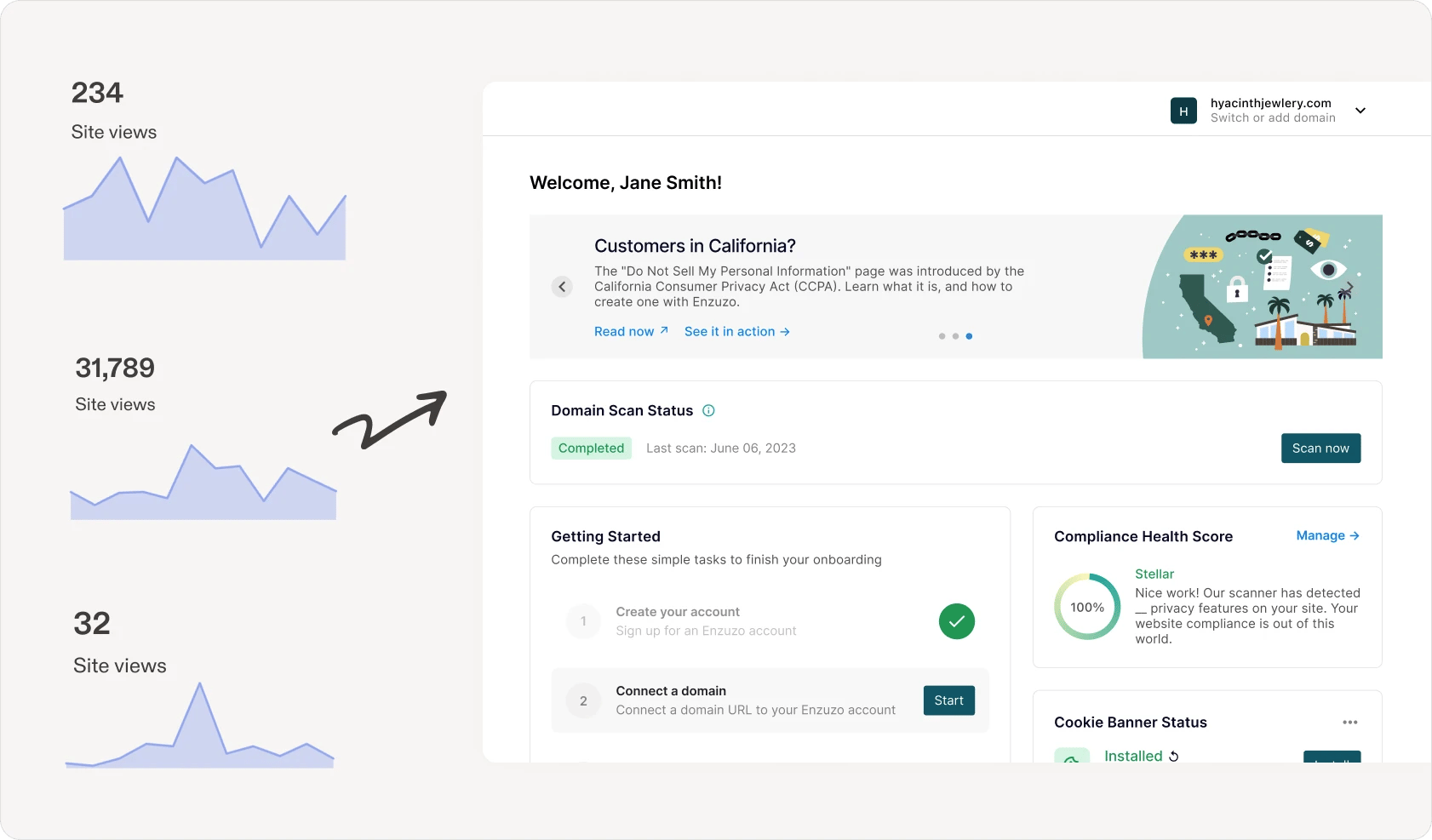
That’s right. Enzuzo offers unlimited website visitors on every plan, even the free one. There are no hidden fees or surprises lying in wait.
2. Fast Onboarding and Friendly UX
Unlike OneTrust or Upguard, Enzuzo is engineered to be fast, lightweight, and simple to set up. Onboarding is simple, with nothing more than a few lines of Javascript required. This means that you’ll spend less time going over the details and more time putting your workflows into action.
Enzuzo reviews tend to call out this particular benefit:
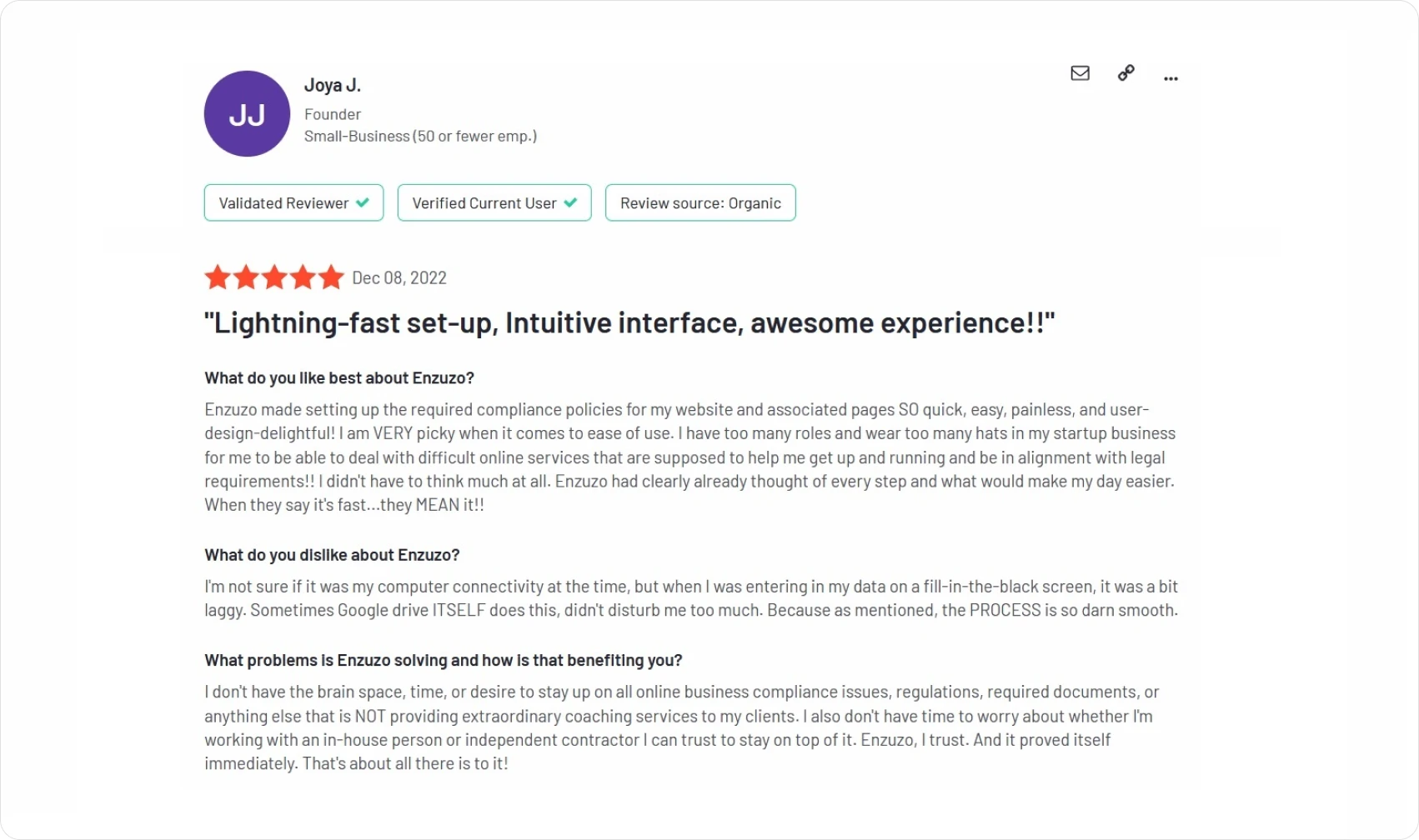
3. Affordable Pricing
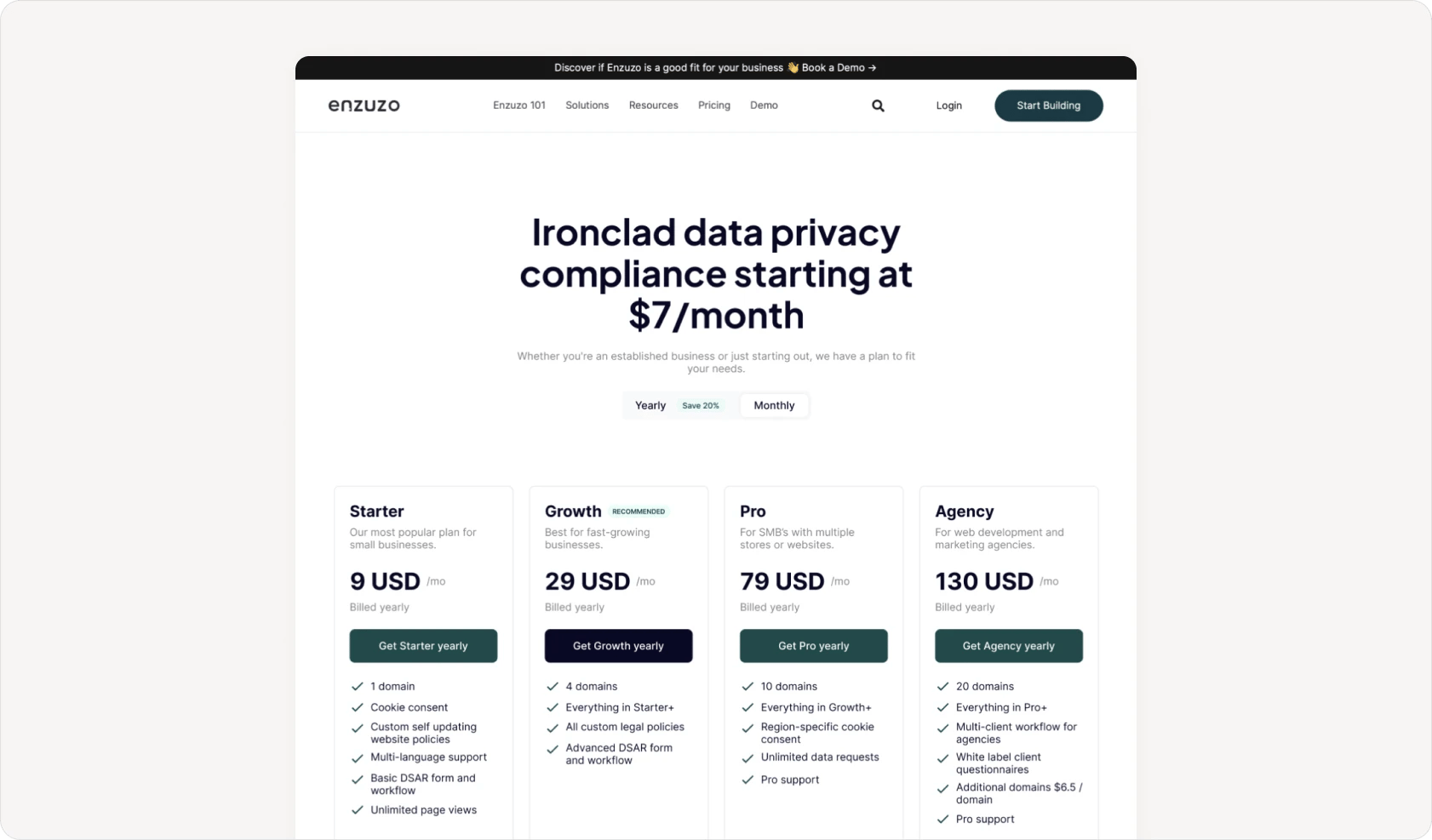
Enzuzo’s Growth Plan starts at just $29/month and includes a host of features that will put you on the path for compliance with the General Data Protection Regulation (GDPR) and other frameworks, such as the California Consumer Privacy Act (CCPA). Better still, Enzuzo requires no long-term contracts. You’re free to cancel whenever you like with no penalties for early termination.
4. Auto-Updating Privacy Policies and Legal Pages
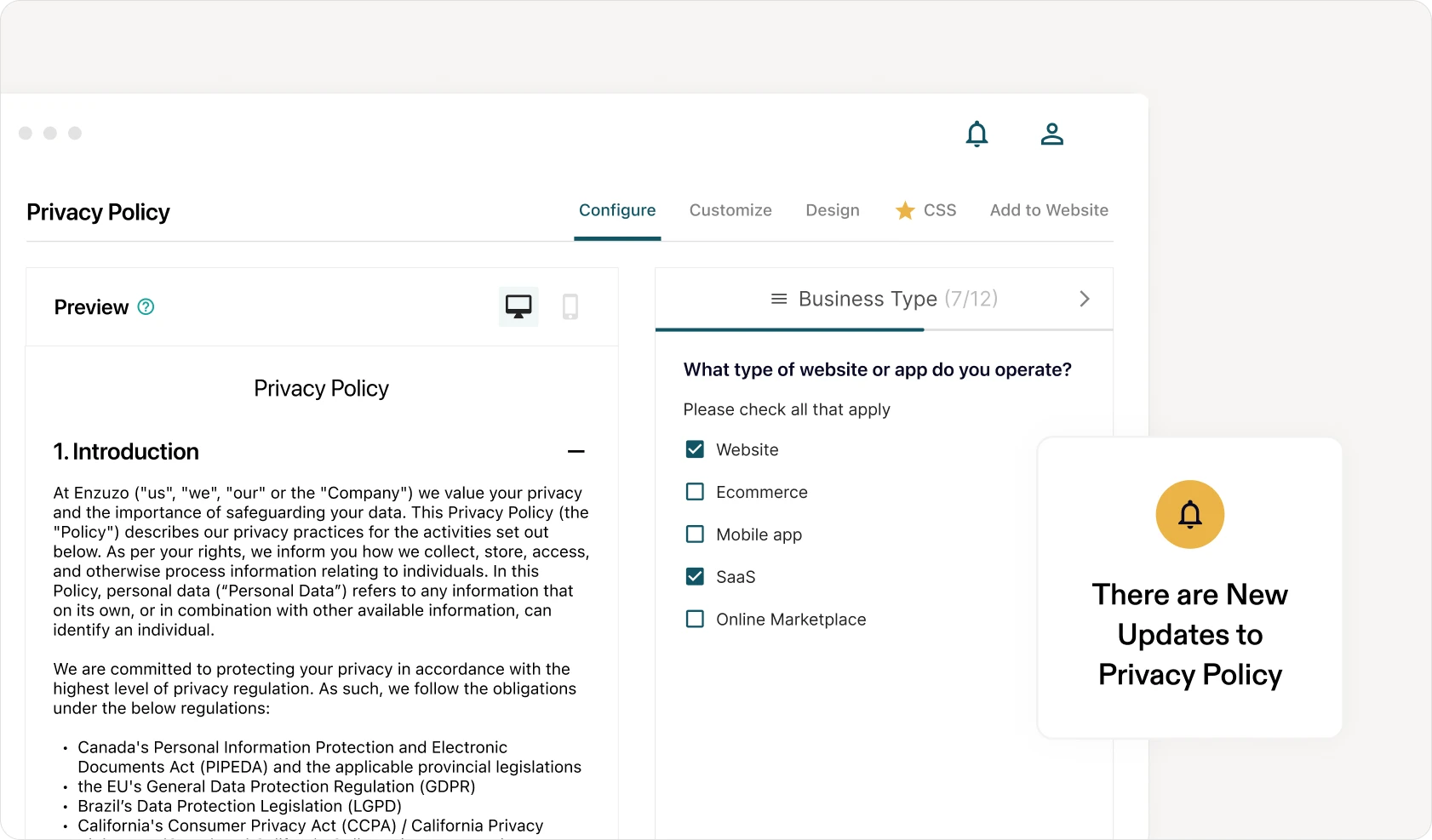
Unlike conventional policy forms that require manual input, all of Enzuzo’s critical legal pages, like privacy policies, are done via a generator. It’s a simple process in which users fill out brief questionnaires during onboarding, which are then transformed into a customized legal document that’s applicable to your country and places where you do business.
While tools offered through Upguard feature automation in reporting and other workflows, it can’t match Enzuzo’s system of automatic updates. Any time a change is noted to a regulatory requirement, Enzuzo handles it on your behalf.
5. Ironclad Features That Assist With Global Compliance Needs
Enzuzo may be reasonably priced, but it more than holds its own against other compliance providers. From cookie consent management tools to advanced needs like data mapping, data governance, and privacy impact assessments, Enzuzo can meet your compliance and risk management needs at a fraction of the cost of other providers.
📢 Read How Global Conglomerate Lucy Group Picked Enzuzo As Its Data Privacy Partner [2023 Case Study]
Learn more about how Enzuzo can assist with your compliance needs. Book 1-1 time with Mate Prgin, CEO👇

Osman Husain
Osman is the content lead at Enzuzo. He has a background in data privacy management via a two-year role at ExpressVPN and extensive freelance work with cybersecurity and blockchain companies. Osman also holds an MBA from the Toronto Metropolitan University.
